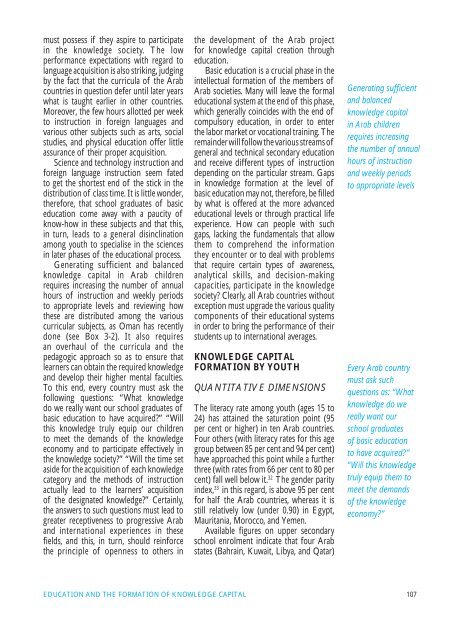Arab Knowledge Report 2009: Towards Productive
Arab Knowledge Report 2009: Towards Productive
Arab Knowledge Report 2009: Towards Productive
- No tags were found...
You also want an ePaper? Increase the reach of your titles
YUMPU automatically turns print PDFs into web optimized ePapers that Google loves.
must possess if they aspire to participatein the knowledge society. The lowperformance expectations with regard tolanguage acquisition is also striking, judgingby the fact that the curricula of the <strong>Arab</strong>countries in question defer until later yearswhat is taught earlier in other countries.Moreover, the few hours allotted per weekto instruction in foreign languages andvarious other subjects such as arts, socialstudies, and physical education offer littleassurance of their proper acquisition.Science and technology instruction andforeign language instruction seem fatedto get the shortest end of the stick in thedistribution of class time. It is little wonder,therefore, that school graduates of basiceducation come away with a paucity ofknow-how in these subjects and that this,in turn, leads to a general disinclinationamong youth to specialise in the sciencesin later phases of the educational process.Generating sufficient and balancedknowledge capital in <strong>Arab</strong> childrenrequires increasing the number of annualhours of instruction and weekly periodsto appropriate levels and reviewing howthese are distributed among the variouscurricular subjects, as Oman has recentlydone (see Box 3-2). It also requiresan overhaul of the curricula and thepedagogic approach so as to ensure thatlearners can obtain the required knowledgeand develop their higher mental faculties.To this end, every country must ask thefollowing questions: “What knowledgedo we really want our school graduates ofbasic education to have acquired?” “Willthis knowledge truly equip our childrento meet the demands of the knowledgeeconomy and to participate effectively inthe knowledge society?” “Will the time setaside for the acquisition of each knowledgecategory and the methods of instructionactually lead to the learners’ acquisitionof the designated knowledge?” Certainly,the answers to such questions must lead togreater receptiveness to progressive <strong>Arab</strong>and international experiences in thesefields, and this, in turn, should reinforcethe principle of openness to others inthe development of the <strong>Arab</strong> projectfor knowledge capital creation througheducation.Basic education is a crucial phase in theintellectual formation of the members of<strong>Arab</strong> societies. Many will leave the formaleducational system at the end of this phase,which generally coincides with the end ofcompulsory education, in order to enterthe labor market or vocational training. Theremainder will follow the various streams ofgeneral and technical secondary educationand receive different types of instructiondepending on the particular stream. Gapsin knowledge formation at the level ofbasic education may not, therefore, be filledby what is offered at the more advancededucational levels or through practical lifeexperience. How can people with suchgaps, lacking the fundamentals that allowthem to comprehend the informationthey encounter or to deal with problemsthat require certain types of awareness,analytical skills, and decision-makingcapacities, participate in the knowledgesociety? Clearly, all <strong>Arab</strong> countries withoutexception must upgrade the various qualitycomponents of their educational systemsin order to bring the performance of theirstudents up to international averages.KNOWLEDGE CAPITALFORMATION BY YOUTHQUANTITATIVE DIMENSIONSThe literacy rate among youth (ages 15 to24) has attained the saturation point (95per cent or higher) in ten <strong>Arab</strong> countries.Four others (with literacy rates for this agegroup between 85 per cent and 94 per cent)have approached this point while a furtherthree (with rates from 66 per cent to 80 percent) fall well below it. 32 The gender parityindex, 33 in this regard, is above 95 per centfor half the <strong>Arab</strong> countries, whereas it isstill relatively low (under 0.90) in Egypt,Mauritania, Morocco, and Yemen.Available figures on upper secondaryschool enrolment indicate that four <strong>Arab</strong>states (Bahrain, Kuwait, Libya, and Qatar)Generating sufficientand balancedknowledge capitalin <strong>Arab</strong> childrenrequires increasingthe number of annualhours of instructionand weekly periodsto appropriate levelsEvery <strong>Arab</strong> countrymust ask suchquestions as: “Whatknowledge do wereally want ourschool graduatesof basic educationto have acquired?”“Will this knowledgetruly equip them tomeet the demandsof the knowledgeeconomy?”EDUCATION AND THE FORMATION OF KNOWLEDGE CAPITAL107
















